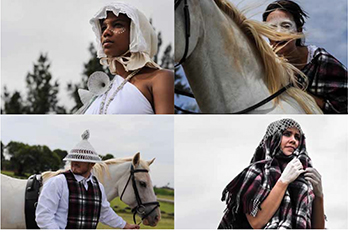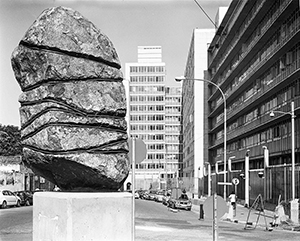
White Horse Project: Concept, Jess Oliveiri & Parachutes for Ladies; Project Manager, Mandi Bezuidenhout; Video, Louis Kruger; Costume, Lesiba Mabitsela; Performers, Gali Malebo, Chris Kleynhans, Busisiwe Matutu, Johandi du Plessis, Elrie du Toit. |
A University of the Free State (UFS) and Free State Arts Festival initiative, the Programme for Innovation in Artform Development (PIAD/PIKO) has worked together with Australian artist, Jess Olivieri (Parachutes for Ladies), to bring visitors and spectators the fantastical and mythical White Horse. The UFS has served as home for the festival for a number of years, and is pleased to take part in bringing this communal project to the arts community that will gather at the annual festival.
The White Horse project begins Sunday 12 July 2015 at 15:00 at the Tweetoringkerk in Bloemfontein, launching the arts festival, while capturing the interest of many members of the Bloemfontein community as well as that of the UFS. The project itself will consist of about 200 members of the local community coming together for workshops in which they will be “reimagining” the White Horse. Olivieri will lead the workshops, which she also developed, assisted by Gali Malebo.
“The White Horse project sits within the contested nature of the White Horse - it is in this in-between space that new mythologies and narratives will be told. The project addresses, celebrates, reconfigures, and allows space for multiple narratives. Given the debate on statues and symbols, the White Horse offers an opportunity to re-purpose and re-imagine symbols in Bloemfontein,” said Olivieri.

Photograph by David Goldblatt, Sculpted by Kagiso Pat Mautloa, a memorial to those who died while in the detention of the Security Police in this building formerly known as John Vorster Square, now Johannesburg Central Police Station. 27 February 2012, Silver gelatin print on fibre based paper, 98 x 120cm |
The White Horse project is supported by the Australia Council for the Arts, Free State Department of Sport, Arts, Culture and Recreation, SituateART in Festivals, Salamanca Arts Centre, Arts NSW, NAVA, Creative Partnerships Australia and the University of Sydney.
Spectators can also look forward to the work of major artists including David Goldblatt’s photographic exhibition titled Structures of Dominion and Democracy at 20:00 on Monday 13 July 2015 at the Johannes Stegmann Art Gallery. In this exhibition, he has photographed everyday sites that contain historical narratives.
Work from other artists at the Arts Festival include Blowing in the Wind (19:00 on Monday 13 July 2015 in the Centenary Gallery), curated by Carol Brown, which is an exhibition that delves into issues of environmental and human exploitation. Angela de Jesus, curator of the UFS Johannes Stegmann Art Gallery, will be curating, [my] PLEK | PLACE (18:30 on Monday 13 July 2015 in the Scaena foyer), in which the artists explore location, space, site, and/or ownership.
The Free State Arts festival begins on 13 July 2015.